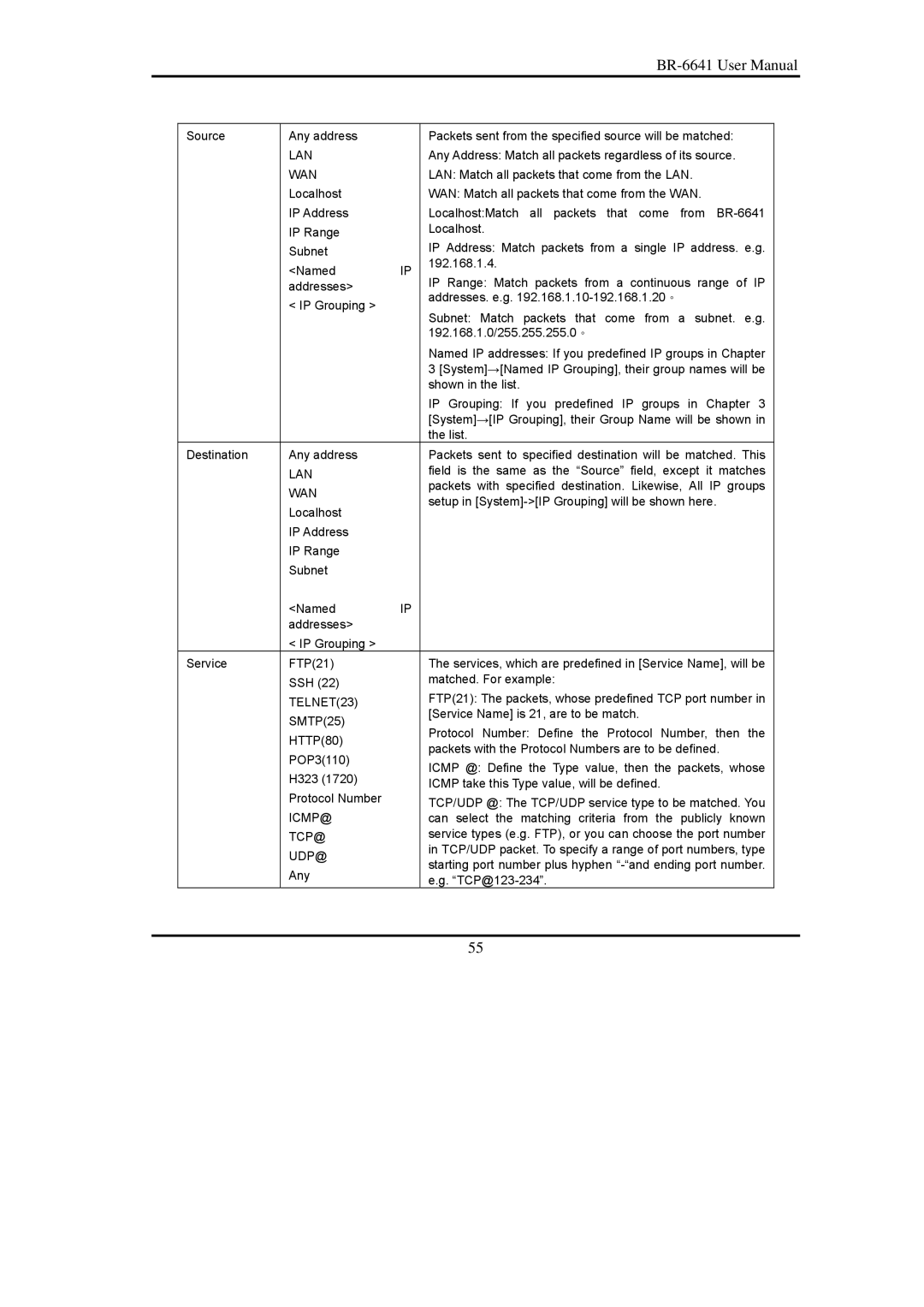|
|
|
| ||
|
|
|
|
|
|
| Source | Any address |
| Packets sent from the specified source will be matched: |
|
|
| LAN |
| Any Address: Match all packets regardless of its source. |
|
|
| WAN |
| LAN: Match all packets that come from the LAN. |
|
|
| Localhost |
| WAN: Match all packets that come from the WAN. |
|
|
| IP Address |
| Localhost:Match all packets that come from |
|
|
| IP Range |
| Localhost. |
|
|
| Subnet |
| IP Address: Match packets from a single IP address. e.g. |
|
|
| <Named | IP | 192.168.1.4. |
|
|
| IP Range: Match packets from a continuous range of IP |
| ||
|
| addresses> |
|
| |
|
| < IP Grouping > |
| addresses. e.g. |
|
|
|
| Subnet: Match packets that come from a subnet. e.g. |
| |
|
|
|
|
| |
|
|
|
| 192.168.1.0/255.255.255.0。 |
|
|
|
|
| Named IP addresses: If you predefined IP groups in Chapter |
|
|
|
|
| 3 [System]→[Named IP Grouping], their group names will be |
|
|
|
|
| shown in the list. |
|
|
|
|
| IP Grouping: If you predefined IP groups in Chapter 3 |
|
|
|
|
| [System]→[IP Grouping], their Group Name will be shown in |
|
|
|
|
| the list. |
|
| Destination | Any address |
| Packets sent to specified destination will be matched. This |
|
|
| LAN |
| field is the same as the “Source” field, except it matches |
|
|
| WAN |
| packets with specified destination. Likewise, All IP groups |
|
|
|
| setup in |
| |
|
| Localhost |
|
| |
|
|
|
|
| |
|
| IP Address |
|
|
|
|
| IP Range |
|
|
|
|
| Subnet |
|
|
|
|
| <Named | IP |
|
|
|
| addresses> |
|
|
|
|
| < IP Grouping > |
|
|
|
| Service | FTP(21) |
| The services, which are predefined in [Service Name], will be |
|
|
| SSH (22) |
| matched. For example: |
|
|
| TELNET(23) |
| FTP(21): The packets, whose predefined TCP port number in |
|
|
| SMTP(25) |
| [Service Name] is 21, are to be match. |
|
|
|
| Protocol Number: Define the Protocol Number, then the |
| |
|
| HTTP(80) |
|
| |
|
|
| packets with the Protocol Numbers are to be defined. |
| |
|
| POP3(110) |
|
| |
|
|
| ICMP @: Define the Type value, then the packets, whose |
| |
|
| H323 (1720) |
|
| |
|
|
| ICMP take this Type value, will be defined. |
| |
|
| Protocol Number |
|
| |
|
|
| TCP/UDP @: The TCP/UDP service type to be matched. You |
| |
|
| ICMP@ |
|
| |
|
|
| can select the matching criteria from the publicly known |
| |
|
| TCP@ |
| service types (e.g. FTP), or you can choose the port number |
|
|
| UDP@ |
| in TCP/UDP packet. To specify a range of port numbers, type |
|
|
|
| starting port number plus hyphen |
| |
|
| Any |
|
| |
|
|
| e.g. |
| |
|
|
|
|
| |
|
|
|
|
|
|
|
|
|
| 55 |
|
Page 56
Image 56
